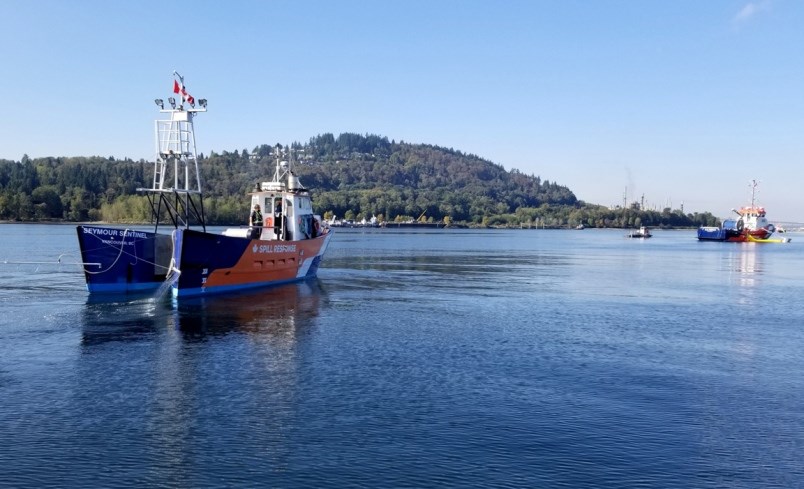Editor:
Re: Trans Mountain tankers no reason to set your hair on fire, NOW letters
I am writing in response to John Hunter’s letter to the editor. He concluded that “I tire of people … claiming the (Trans Mountain) tankers are a huge and unacceptable risk to B.C. waters.”
However, I believe that that Trans Mountain tankers do create a huge and unacceptable risk on the coast of B.C.
One of Mr. Hunter’s reasons was “firstly, in the century-plus of oil tanker operations in B.C. waters – much or most of it before radar, GPS, double hulls, coastal pilots, escort tugs, and so on - the only spill incident from an oil tanker in B.C. waters was a loading accident with canola oil in Vancouver harbour.” When I read this reason, I started to research, finding it fairly unbelievable that there had been no oil spills from oil tankers beyond one with canola oil.
I came across that case of the MV Marathassa, which occurred in 2015.
This incident involved a Greek cargo ship that leaked 2,700 litres of oil into the English Bay. This was not an oil tanker but a cargo ship; however if an oil spill can occur with a cargo ship that primarily carries goods then it is significantly more likely that an oil tanker will cause an oil spill off the B.C. coast.
This is why the risk of tankers in B.C. coastal waters is too high and unacceptable to even consider.
The second reason that Mr. Hunter tires of hearing about the “huge and unacceptable risk” of oil tankers in B.C. coastal waters is that there has never been a serious incident in Canadian waters with a crude oil tanker.
He stated that “secondly, there has never been a serious incident with a crude oil tanker in Canadian waters, other than war-related.” He does go on to acknowledge that there have been two major spills on the East Coast years ago which contradicts his initial premise.
One of the major spills that Mr. Hunter is most likely referencing is in 1970, off the East Coast of Canada the tanker S.S. Arrow spilled 10, 000 tonnes of oil into the ocean. This, according to the Government of Canada, has been the largest oil spill in Canadian history. His initial statement that there has been no incident with a crude oil tanker is inaccurate despite his regard of the two spills in the next line.
Mr. Hunter also brings up the point that oil tankers are so safe, they are being used on the Great Lakes. He wrote that “thirdly, oil tankers in Canadian waters have been so safe that they ply the Great Lakes, the source of drinking water for several U.S. states and Ontario.”
Mr. Hunter raised an inaccurate reason to support his conclusion. According to the Great Lakes Sea Grant Crude Oil Transport Team (2019), there is currently no large oil tankers shipping oil on the Great Lakes. Small amounts are being shipped on barges and small vessels, however, no large tankers on currently shipping oil. This depicts that Mr. Hunter’s reasoning is flawed. In addition to this, the Sea Grant company has laid out the possible drawback and causes of spills on their website depicting that transporting oil is not completely safe and there are significant measures that need to be placed in order to protect the lakes.
Trans Mountain tankers do create a huge and unacceptable risk on the coast of B.C. The consequences of a large-scale oil spill will be extremely detrimental to wildlife, ecosystems, coastal communities and local economies. One spill could impact and endanger many different things. The Tsleil-Waututh have completed a study for their peoples to evaluate the impact of a tanker spill on the Burrard Inlet.
One example that came from this study is that if a spill would occur in the inlet, a worst-case scenario could create the loss of 100,000 to 500,000 birds in the area which would proceed to completely disrupt food-webs and possibly result in environmental collapse.
In addition to that, there is enhanced risk of running aground in the shallow river. Tankers have to be extremely careful when leaving the inlet in order to have enough clearance. Also, the double hulls will not be enough to prevent an oil spill should a tanker run aground. The increase in tanker traffic also increases the number of spills that may occur. If the pipeline is created there will be a large upsurge of tankers coming to the B.C. coast highly increasing the risk of an oil spill. The risk of Trans Mountain tankers is not worth the risks due to immense damage that could occur should a tanker spill.
Sherlynn Den Boer



